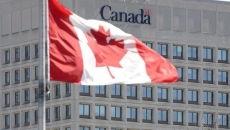Canadians dramatically altered their behaviour by permanently reducing their interactions with others even as they began moving around more during the pandemic, a new study of cellphone data suggests.
A policy report released Tuesday by the University of Toronto examined movement data from about 870,000 Canadians throughout 2020.
Data showed both distance travelled from home and proximity to others plummeted on Friday, March 13 - two days after the World Health Organization declared COVID-19 a pandemic.
Canadians gradually returned to levels of movement seen before the pandemic in June, the study said, but proximity to others dropped significantly — and has remained low through October.
"What is already clear is that Canadians have demonstrated a profound capacity for collective behavioural change, and an equally remarkable capacity to maintain social distance while restoring mobility within local areas," the study's authors said in the report titled Mobility and Proximity in Canada During the COVID-19 Pandemic.
Anita McGahan, one of the study's authors from the university's Munk School of Global Affairs and Public Policy, commended Canadians for limiting their interactions with others throughout the pandemic.
"Canadians should be really proud of this," she said.
"This is really quite an achievement. It's a cultural, behavioural change to try to stay socially distanced during the summer months."
For example, Toronto saw a significant decrease in interactions between devices. In late February on a weekly average basis, one device interacted with about 7.5 other devices per hour. By mid-March, that average dropped to 2.8 devices per hour.
That number creeped up in the summer months to about 3.5 interactions per hour, but has since fallen down to about 2.5 interactions per hour, the study shows.
Montrealers were among the best in the big cities to limit interactions with others, McGahan explained.
There they peaked, on a weekly average basis, at about 5.45 interactions per device per hour in late February and early March to about two interactions per device per hour a few weeks later. It, too, crept up in the summer to a shade below three interactions per hour, but has since dropped back to two interactions per hour by early October.
Vancouver fared worse.
They peaked a touch over six interactions per hour on a weekly average basis in early March, which dropped to about 3.4 interactions by late March. The interactions jumped back up to about 4.5 interactions per hour by late May and hovered there for about two months until creeping to a low average of about 3.8 in early October.
Calgarians showed a significant drop in proximity and are now only averaging about 1.5 interactions per device per hour, compared to about three interactions per hour in late February.
Mobility, the average distance travelled from home, returned to pre-pandemic levels by the summer in most parts of the country, the study shows.
But the nature of travel changed dramatically, with most avoiding air travel.
"The rebound was strongly driven by local ground rather than air travel," the authors wrote.
"The presence of smartphones at airports shows enduring reductions that are significant and persistent. In contrast, we find evidence of significant increases in travel between closely located census divisions within Canada, such as Toronto and Peel; and Vancouver and Victoria."
McGahan said Cuebiq, an American company, donated the smartphone data from its Data for Good Program. The data is collected every 15 seconds from those who opt-in to the program, which is found in about 100 different apps on Apple and Android devices. The data is anonymized and privacy-enhanced, McGahan explained.
A proximity interaction occurs when one device is within 50 metres of another device for more than five minutes in a given hour, she said.
While McGahan praised Canadians, she also said the worrisome side of the study is that this may be the best we can do.
The proximity data is already really low, she said, considering that the average family household in Canada has 2.9 people.
"In many parts of Canada, and certainly on average, proximity is still low," McGahan said.
"It doesn't look like by shutting down everything again, having broad restrictions on our mobility, that we're going to be able to get much more reduction in social interactions."
She said the researchers are now planning to incorporate medical and economic data in an effort to tease out any associations.






